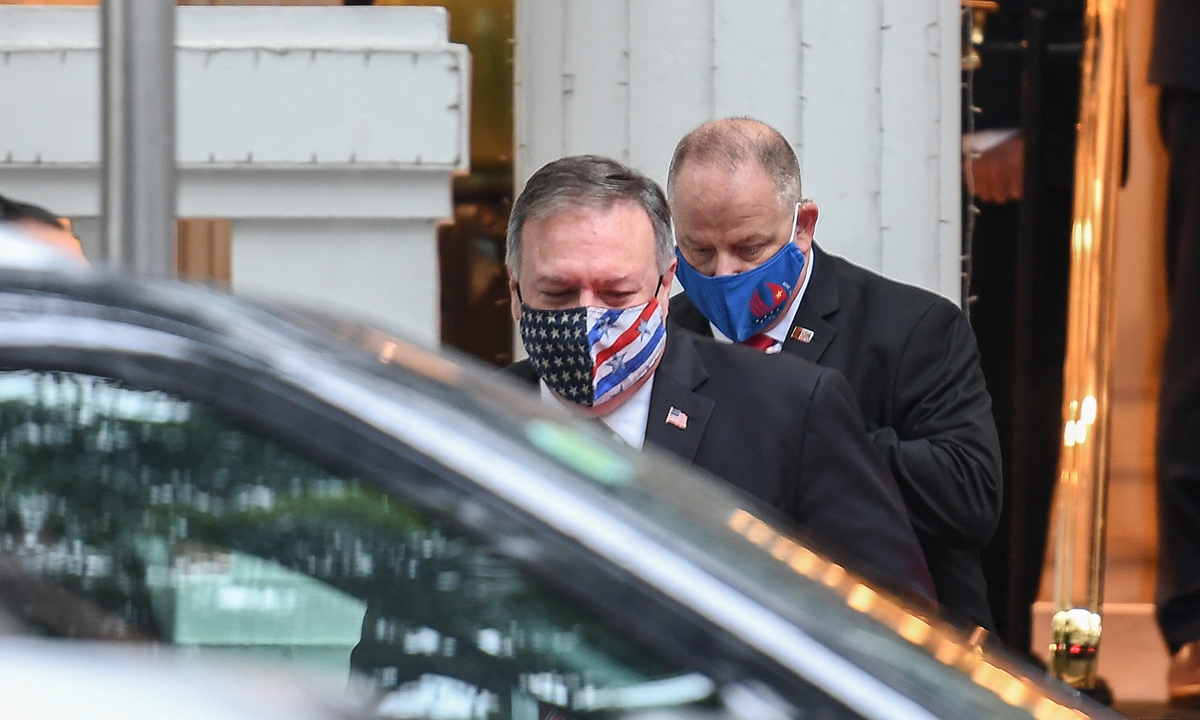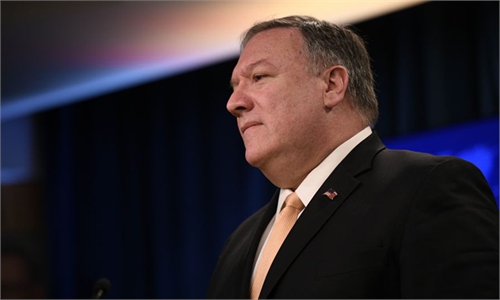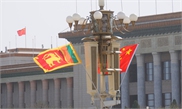
Photo:AFP
US Secretary of State Mike Pompeo is on the last foreign trip of his term of office. He visited India, Sri Lanka, the Maldives, Indonesia, and, at the last moment, Vietnam. The agenda of Pompeo's trip is very clear: coercing and luring these countries to confront China in policy and hoping to establish a "little NATO" in Asia with a strong anti-China tone.
Pompeo played a wide range of cards during this trip. In Sri Lanka, Pompeo warned against Sri Lanka's strengthening ties with China, accusing China of luring the country into a "debt trap" and being a "predator." In the Maldives, Pompeo said the US will open an embassy there, in an effort to counter China's expanding influence in the region. In Indonesia, Pompeo attempted to use the maritime territorial dispute to drive a wedge between China and Indonesia, rejecting China's legitimate claims in the South China Sea.
However, Pompeo's anti-China campaign is doomed to futility, and his strong anti-China policies and rhetoric have aroused the dissatisfaction of these countries.
Sri Lankan President Gotabaya Rajapaksa said on Wednesday, when meeting with Pompeo in Colombo, that Sri Lanka is not caught in a "debt trap" by accepting help from China. The president tweeted: "Sri Lanka will always maintain a neutral stand in foreign policy and will not get entangled in struggles between power blocs."
Indonesian officials have also expressed concern about Washington's strong anti-China policies and rhetoric, as well as rising tensions between major powers. At a joint news conference with Pompeo, Indonesian Foreign Minister Retno Marsudi reiterated the need for "inclusive cooperation amidst this challenging time."
It has been a long time since the Trump administration began its anti-China lobbying campaign, forcing Southeast Asian countries to take sides in the strategic competition between China and the US. Judging from the attitudes of the countries involved in this trip, Pompeo's efforts are destined to be a dead end.
In fact, Indonesia and other Southeast Asian countries have been consistent in their attitude toward the anti-China lobbying campaign of the US. In September, Indonesia's foreign minister Marsudi made it clear that Indonesia doesn't want to "get trapped" by US-China rivalry. "We don't want to be duped into an anti-China campaign," former Indonesian ambassador to the US Dino Patti Djalal also said.
Indonesia's stance is highly symbolic among ASEAN countries. The differences between ASEAN countries and the US in their perception of China, as well as the differences between ASEAN countries' unique perceptions of China and the US, have together decided the failure of Pompeo's anti-China lobbying policy.
Unlike the US, which sees China as a "revisionist state" and strategic competitor, ASEAN countries have the most real sense of China's economic rise and growing influence in the region, and their open and inclusive attitude toward China in regional affairs has not changed. As China is playing an increasingly active role in the governance of regional affairs, ASEAN countries are increasingly emphasizing China's responsibility in regional affairs and "embracing" China in the security field.
ASEAN member countries have always had significant differences in their policies toward the US and China. Although some may hope to drag US power into regional affairs out of their concerns about China, more ASEAN countries are more willing to keep the influence of China and the US in a dynamic balance in regional affairs. ASEAN countries are more inclined to develop dialogue and cooperation with China with certainty and stability. In their eyes, instead of being a part of the US containment policy on China, it is better to strengthen political dialogue, upgrade economic and trade cooperation and expand cultural and people-to-people exchanges with China pragmatically.
Certainly, the pressure on ASEAN countries to take sides is growing under the threats of the US. But facing the pressure, ASEAN countries generally have maintained their consistent attitude: First, they will not take sides in the China-US competition. Second, ASEAN countries still hope to maintain friendly and cooperative relations with China and the US at the same time, maintain openness, and ensure a dynamic balance between China and the US in regional affairs. Third, China-US relations are very important and the two countries should strengthen communication and dialogue, enhance the awareness and ability of risk management, properly handle their relations and work together in the process of solving global issues.
In short, ASEAN countries haven't responded to Pompeo's anti-China lobbying. They are now more determined than ever to maintain their "centrality" status in regional affairs. In this sense, although Pompeo tried to make waves, there is no wind in Southeast Asia, nor will any wave be stirred.
The author is a senior research fellow of the Charhar Institute in China and the Deputy Dean of the ASEAN College of Guangxi University for Nationalities. opinion@globaltimes.com.cn


